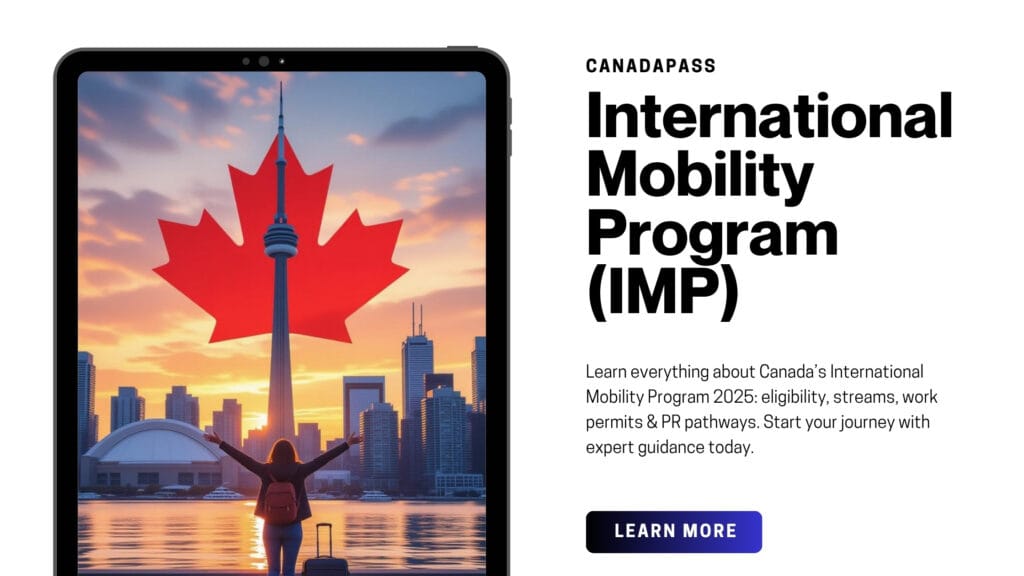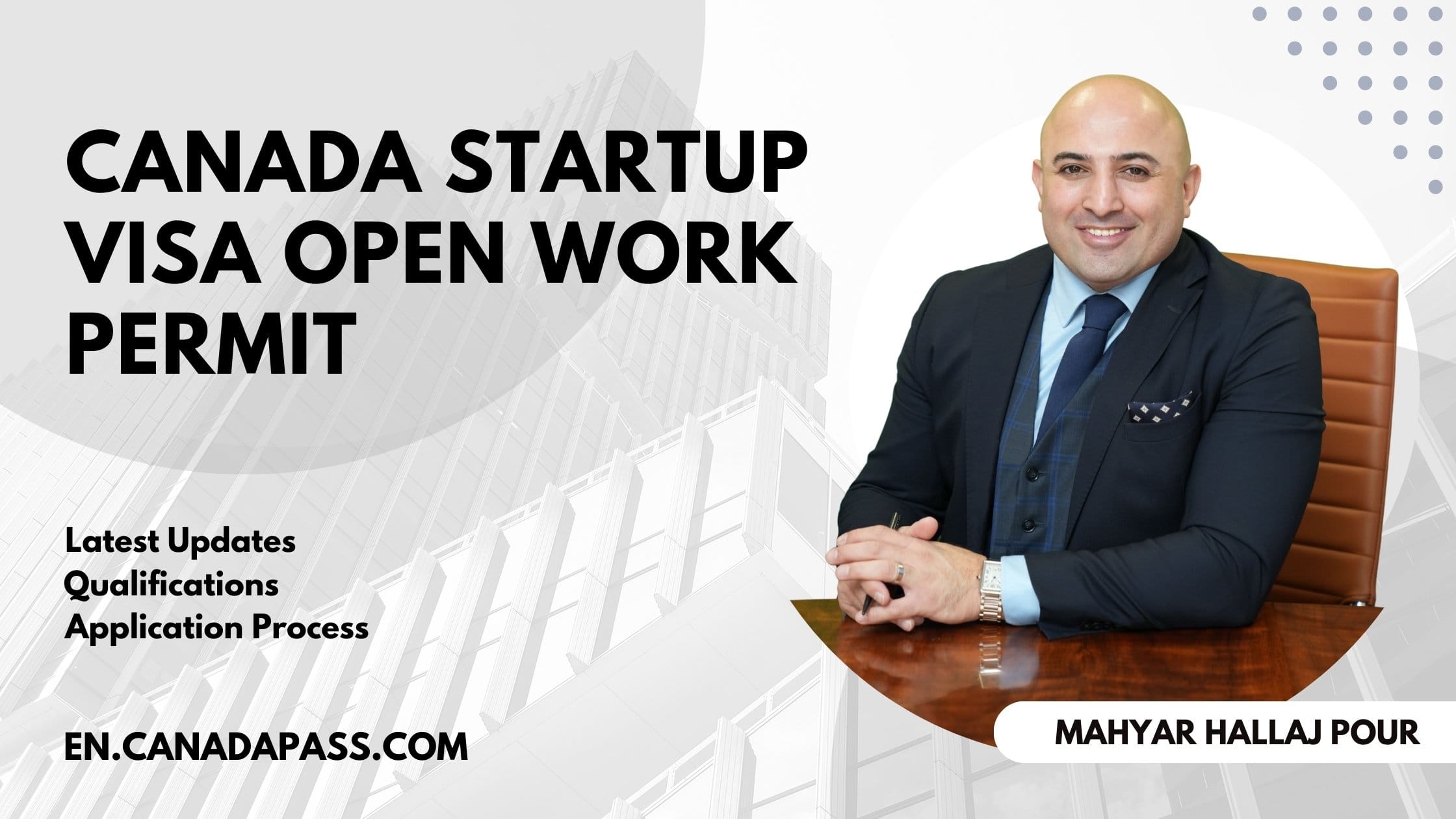In 2025, Canada’s
International Mobility Program (IMP) stands at a pivotal crossroads, balancing a renewed national focus on sustainable immigration with urgent labour market needs in high-demand sectors such as technology, healthcare, and skilled trades. As new caps and policy updates reshape temporary and permanent immigration streams, understanding the IMP’s latest structure and eligibility requirements has become more crucial than ever for foreign workers, international graduates, intra-company transferees, and Canadian employers alike.
For international talent aged 18–35, especially those eyeing routes like International Experience Canada (IEC), Post-Graduation Work Permit Program (PGWP), Intra-Company Transfers (ICT), or trade agreement-based pathways, mastering the 2025 IMP rules is key to unlocking career pathways in Canada without the bottlenecks of a Labour Market Impact Assessment (LMIA) and extended application timelines.For employers in sectors facing acute labour shortages—most notably tech and healthcare—the IMP offers LMIA-exempt options that are now, more than ever, subject to evolving compliance and quota scrutiny under new federal objectives to keep temporary residents below 5% of the population.This guide delivers a comprehensive, actionable overview of the IMP as redefined in 2025: who it serves, what recent changes mean for you, how it compares to the Temporary Foreign Worker Program (TFWP), step-by-step application processes, common pitfalls, and the critical updates every applicant and employer must know.
What is the International Mobility Program (IMP)?
The International Mobility Program (IMP) is Canada’s primary work permit program for hiring or entering Canada as a temporary foreign worker without an LMIA. It aims to advance Canada’s economic, social, and cultural interests through diverse streams that enable in-demand skilled workers, international graduates, intra-company employees, youth participants, and more to work in Canada rapidly and flexibly.
Key Features of IMP
- No Labour Market Impact Assessment (LMIA) Required:
- Workers under the IMP do NOT need the time-consuming and costly LMIA, which is otherwise required to prove a lack of qualified Canadians for a job.
- Diverse LMIA-Exempt Streams:
- Includes participants in trade agreements (e.g., CUSMA, CETA, CPTPP), IEC, intra-company transferees, post-graduate work permits, spouses and dependents (under stricter eligibility in 2025), performing artists, Francophone mobility, and more.
- Streamlined, Faster Processing:
- Since there is no mandatory labour market test, eligible work permits are normally processed more swiftly than LMIA-based TFWP permits, often within 2-8 weeks for most categories.
- Permit Types:
- Open work permits (work for any employer) and employer-specific permits fall under the IMP if they meet the exemption criteria.
International Mobility Program role in the 2025–2027 Canadian Immigration Plan
Canada’s
2025–2027 Immigration Levels Plan has ushered in a new era of careful management and recalibration for both the IMP and TFWP, with a goal to keep the temporary resident share under 5% of the total population by the end of 2026. This is a response both due to record growth in recent years and to housing, infrastructure, and community pressure events.
- 2025 Target: 285,750 IMP entries (including 5,000 for crisis/humanitarian arrivals)
- 2026: 128,700
- 2027: 155,700
- Comparison: In contrast, over 627,000 IMP permits (including extensions) were issued in the first ten months of 2024, showing a significant contraction in new permits flowing from the new strategy.
Key IMP messages in the new plan:- Prioritizing essential sectors (healthcare, construction, trades, tech).
- Shifting the balance towards permanent residence by favouring applicants already in Canada.
- Tightening eligibility for key LMIA-exempt streams (including spousal work permits and PGWP).
- Promoting Francophone and regional diversity.
- Supporting humanitarian and economic goals.
LMIA Exemptions & Advantages: IMP vs. TFWP
What Does LMIA-Exempt Mean?
A
Labour Market Impact Assessment (LMIA) is a formal process in which an employer must prove to the government that hiring a temporary foreign worker will not negatively affect the Canadian labour market. Under the
IMP’s LMIA-exempt mechanism, the onus is shifted from proving short-term shortage toward broader national objectives or reciprocal international agreements.
Key advantages for applicants and employers:- No LMIA cost: Bypasses a $1,000+ government fee and months-long process.
- Faster timelines: Eligible workers can often secure permits within weeks, not months.
- Flexibility: Many streams allow for open work permits that aren’t tied to a single employer.
- Broader eligibility: Many streams allow for intra-company transfers, IEC applicants, and others under trade or youth mobility agreements.
- Employer compliance, not market-based recruitment: Employers hiring under LMIA-exempt streams still have compliance obligations (job offers, portal submissions, fees), but do not need to go through local recruitment requirements.
Table: Comparing IMP vs. TFWP Key Characteristics| Feature | IMP | TFWP |
|---|
| LMIA Requirement | Not required | Required for all streams |
| Permit Types | LMIA-exempt (open or employer-specific) | LMIA-based, always employer-specific |
| Main Goal | Economic, social, cultural reciprocity | Fill precise labour market shortages |
| Target Sectors | Tech, health, trades, culture, youth | Agriculture, caretakers, lower-skilled…and high-skilled jobs |
| Application Steps | Employer Portal submission (except OWP), then individual applies | Employer gets LMIA, then worker applies |
| Median Processing Time | 2–8 weeks (varies by stream) | 4–12+ weeks (delays more frequent) |
| Open to Which Occupations? | Designated, per LMIA exemption lists | All if LMIA obtained, otherwise limited |
| Employer-Driven? | Yes, but not market tested | Yes, must advertise to local workers |
| Core Compliance | Fees, job offers, inspections possible | Recruiting, LMIA, inspection regime |
| Used Most By | Skilled grads, youth, tech, NGOs, companies | Farming, caregiving, food, construction |
Table Summary:
The
IMP is distinguished by its LMIA exemption, enabling faster, less costly, and more flexible employment for those fitting its broad exceptions. The TFWP, while still vital for seasonal and certain high-demand jobs, has become increasingly restricted and focused on genuine, hard-to-fill shortages, with the onus of proof on the employer and additional limitations on locations and employer quotas set for 2025–2027.
IMP Streams and Updated 2025 Eligibility Criteria
The IMP offers an array of LMIA-exempt streams (each with unique requirements). The main categories are:| Stream/Program | Eligibility Highlights | Permit Type | Standard Max Duration | Age/Field Restrictions |
|---|
| IEC (International Experience Canada) | Youth (18–35), citizens of partner countries. Working Holiday/Young Professionals/Interns categories | Open / Employer-specific | 12–24 months (country-specific) | 18–35 (country) |
| Intra-Company Transferee (ICT) | Employees of multinational company transferred to Canada. Must hold specialized knowledge/managerial role | Employer-specific | Up to 3 years (renewable) | No age limit, skilled workers |
| Trade Agreements (FTA/CUSMA, CETA, CPTPP, UK, etc.) | Citizens of partner countries in listed occupations/professional roles | Employer-specific / open | Up to 2-3 years (per agreement) | Country-specific, occupation-specific |
| PGWP (Post-Graduation Work Permit) | Graduates of eligible Post-Secondary Institutions in approved fields (see 2025 CIP code changes) | Open | Up to 3 years (study program duration-dependent) | No age/field restrictions for degree, field restriction for non-degree |
| Spousal Open Work Permit (SOWP) | Spouse of: Master’s/PhD student (16+ months), select professional programs, or high-skilled worker in TEER 0/1 or select 2/3 roles | Open | Parallels permit duration of sponsor | See 2025 limits below |
| Francophone Mobility | French-speaking worker outside Quebec, moderate French | Employer-specific | Up to 3 years (renewable) | French language proficiency |
| Significant Benefit | Exceptional benefit to Canada (culture, academia, entrepreneurs, etc.) | Both | Discretionary | Evidence-based validation |
| Cultural/Social Programs (Artists, Researchers, etc.) | Artist, researcher, cultural exchange participant | Both | Typically project-based duration | Evidence of contribution |
Explanatory Summary:
Each IMP stream has distinct requirements. For IEC, age and citizenship are critical. For intra-company and trade-agreement paths, occupation and transfer within a multinational are vital. Recent graduates must carefully match their program’s field to eligible CIP codes (see PGWP section below). Most SOWPs in 2025 are restricted to specific study and occupation levels, a significant tightening compared to 2023–2024.
Spotlight: International Experience Canada (IEC) in 2025
IEC remains the most popular route for young adults from over 30 countries, providing up to two years of work experience in Canada (country-specific durations apply). Categories include Working Holiday (open permit), Young Professionals (employer-specific), and International Co-op. Age and country of citizenship determine eligibility; most streams are open to those 18–35, with a few capping at 30.
Family and dependent eligibility:
IEC participants cannot directly bring dependents, though spouses may independently apply for other work permits.
Spotlight: Tech and Innovation Sector Streams
Canada’s tech sector continues to expand recruitment under IMP’s innovation stream:- Innovation Stream: For high-growth, government-identified tech firms under the Global Hypergrowth Project (GHP), offering LMIA-exempt permits for high-skilled occupations (TEER 0–3). Applicants need a valid job offer and to meet education/experience standards for the NOC. Employers must register in the GHP and submit job offers through the IRCC Employer Portal.
- Other tech talents: Under GSS (Global Skills Strategy), qualifying LMIA-exempt applications (IMP) are processed swiftly, particularly for TEER 0–1 roles, with a general two-week target.
Implications:
Tech employers with GHP status can leverage this stream for faster global recruitment, especially for AI, life sciences, SaaS, clean-tech, and engineering staff. Non-GHP tech employers still benefit from trade agreement exemptions and GSS when eligible.
Spotlight: Healthcare and Construction Sector Streams
Healthcare and skilled trades remain priorities:- Healthcare: Nurses, doctors, pharmacists, allied professionals, and researchers can access IMP streams through trade agreement exemptions, significant benefit designations, post-graduation work permits, and intra-company transfers.
- Construction: New 2025 initiatives include a regularization pathway for undocumented construction labourers and a support measure for foreign apprentices (permits/study permit removal), all designed to address urgent housing and skilled labour supply issues.
Spotlight: PGWP (Post-Graduation Work Permit) 2025 — New Field and Language Restrictions
The
2025 PGWP changed eligibility rules for most non-degree graduates in profound ways:
- Field of Study: As of November 1, 2024, non-degree graduates must have completed a listed program with a CIP code eligible for a PGWP (i.e., in demand per Canada’s labour shortages and Express Entry priorities).
- List Updates: In July 2025, IRCC added 119 fields, mainly in STEM, health, education, and trades, and removed 178 less in-demand fields. As of August 2025, there are 920 eligible programs. The complete official list is maintained online and updated at least annually.
- If a student applied for a study permit before June 25, 2025, they retain eligibility even if their field is later removed.
Degree-level (bachelor’s, master’s, PhD) graduates are not restricted by field but must study at a designated learning institution.
| Type of Program | PGWP-Eligible? (2025 update) |
|---|
| Bachelor’s/Master’s/Doctoral | Yes, any field if at an eligible DLI |
| College Diploma/Certificate | Only if listed on the eligible CIP code list at the time of study permit application |
| Public-Private Partnership | Not eligible (as of January 2024 rule clarification) |
Tip for applicants:
If in doubt, check your intended program’s current CIP code against the
IRCC’s latest eligible list before enrolling.
Spotlight: 2025 Spousal Open Work Permit (SOWP) Restrictions
2025 marks a dramatic restriction on SOWP eligibility:
- Spouses of International Students: Eligibility is now limited to spouses of those in master’s programs (16+ months), doctoral degrees, and certain professional (e.g., medicine, law, engineering) or pilot programs.
- Spouses of Foreign Workers: Only those whose partner holds a permit in a TEER 0/1 occupation or select TEER 2/3 jobs in sectors with shortages (healthcare, construction, natural/applied sciences, military, education, and some pilots) are eligible. Foreign worker must have at least 16 months remaining on their permit.
- Dependent Children: No longer generally eligible for open work permits (except those transitioning to PR).
- Transition/Grandfathering: Applications submitted prior to Jan 21, 2025, are assessed under earlier rules. Families losing eligibility may apply for an employer-specific (job-offer based) permit instead.
| Spouse Type | Eligible for OWP in 2025? |
|---|
| Spouse of Bachelor’s/Diploma Student | No |
| Spouse of Master’s/PhD (16+ months) Student | Yes |
| Spouse of skilled worker TEER 0/1 (or select TEER 2/3) | Yes |
| Spouse of lower skilled worker TEER 4/5 | No |
| Spouse of workers in agriculture/service roles | Usually No, with rare exceptions |
Spotlight: Francophone Mobility, Humanitarian, and Reciprocal Streams
- Francophone Mobility: Moderate French-proficient applicants (outside Quebec) get LMIA-exempt permits under a special stream supportive of minority Francophone communities.
- Economic Mobility Pathways Pilot (EMPP): Now permanent in 2025, providing a stable economic immigration option for refugees with in-demand skills.
- Reciprocal Employment: Artists, athletes, cultural exchange participants, academic researchers, and others, where both Canada and another country benefit from the exchange, are eligible under relevant LMIA exemption codes.
New in 2025: Reduced Temporary Resident Targets & Application Impact
The 2025–2027 plan is reducing new temporary arrivals while promoting in-Canada transitions to permanent residence, especially in workforce-critical sectors:- International student intake has been capped (a further 10% reduction from 2024); PGWP rules tied to labour market need.
- IMP and TFWP together now make up 5% or less of Canada’s total population, with targets for new arrivals only (extensions and status transitions not counted).
- Employers, especially in non-prioritized industries, face heightened scrutiny.
- New employer quotas and city-based bans: Certain cities with high unemployment (6%+) are excluded from low-wage LMIA approvals, unless for food security, healthcare, or construction.
Practical advice for applicants and employers:- The best prospects in 2025–2026 are for those already in Canada, or for occupations and programs closely tied to critical shortages and government priorities.
- IEC and PGWP quotas will fill more quickly; get documentation and forms ready early in the annual cycle.
- Spouses and dependents: Plan financials and work status expectations well in advance.
IMP vs. TFWP: Detailed Comparison Table
| Aspect | IMP (International Mobility Program) | TFWP (Temporary Foreign Worker Program) |
|---|
| Core Purpose | Broader economic/social/cultural benefit, or international reciprocity | Addressing specific, employer-verified local labour shortages |
| LMIA Requirement | No | Yes |
| Lead Department | IRCC (Immigration, Refugees & Citizenship) | ESDC/IRCC (Employment & Social Development/IRCC) |
| Permit Type | Open or Employer-Specific | Always Employer-Specific |
| Recruitment Obligation | None (employer compliance instead) | Strict, must advertise/offer to Canadians first |
| Processing Time | Usually faster (2–8 weeks, varies by stream) | 4–12 weeks, often delayed by LMIA procedure |
| Open to All Occupations? | Stream or policy-specific only | Yes, if LMIA is approved for the role |
| Extensions/Renewals | Often allowed, depending on stream/rules | Allowed, repeat LMIA required |
| Family Eligibility | Many, with new restrictions (see SOWP) | Fewer, some spouse access if LMIA and skill level |
| Employer Portal Use Required? | Yes (unless OWP) | Yes |
| Compliance Inspections | Yes (employer inspections, fees) | Yes |
| Use by Sectors | Tech, trade, education, health, culture, youth | Agriculture, caregiving, food, lower-wage, and some skilled |
| Example Streams | PGWP, IEC, Trade Agreements, Intra-company, Francophone | High/low wage TFW, Agriculture, Caregiver, Seasonal |
| Main 2025 Quota | 285,750 new entries | 82,000 new entries |
Analytical Commentary
The
IMP is more versatile and future-focused, supplying talent to Canada in line with economic priorities and international agreements, while the TFWP is now sharply targeted toward genuine shortages and proven recruitment failures. Policymakers aim to “right-size” both, but in practice, the IMP will see sharper eligibility and compliance enforcement in closely monitored streams during 2025–2026.
IMP Process: Step-by-Step Guide for Employers and Applicants (2025 Edition)
For Applicants: How to Secure an IMP Work Permit- Check your stream eligibility: Confirm you meet the criteria for your chosen LMIA exemption (e.g., IEC, ICT, FTA, PGWP, SOWP).
- Obtain or receive a job offer (if applicable): For employer-specific permits, the Canadian employer must submit a job offer (Offer of Employment Form) and employer compliance fee ($230 CAD) through the Employer Portal.
- Gather supporting documents: Passport, qualifications, proof of program (PGWP), proof of relationship (spousal permits), language results (Francophone Mobility), etc.
- Complete the online application: Through the IRCC portal, upload documents, fill requisite forms (IMM 1295 outside Canada; IMM 5710 inside Canada), and pay application fees.
- Biometrics & medical exam: Attend exams if required.
- Track your application: Use the IRCC portal for updates.
- Letter of introduction: If approved, you’ll get a letter to present at the port of entry (if outside Canada). Receive the work permit on arrival or by mail (if inside Canada).
For Employers:- Confirm LMIA-exemption stream eligibility.
- Submit to Employer Portal: Complete and submit the offer, pay $230 compliance fee, and obtain the offer of employment number (for sharing with the worker).
- Support compliance: Provide accurate job details, stay ready for possible inspections, and keep records.
- Await the worker’s application and arrival.
- Upon arrival: Meet obligations, uphold wages and working conditions, avoid compliance breaches/penalties.
Benefits of the IMP for Each Stakeholder in 2025
| Stakeholder | Benefits Under IMP |
|---|
| Foreign Workers | LMIA-exempt applications = faster access to jobs; open permits offer flexibility; streamlined path to PR (through Canadian work experience); easier family work options (where eligible) |
| International Students | PGWP supports post-study career start, open work options, pathway to PR (CEC/Express Entry); focus on in-demand sectors maximizes odds of settlement |
| Youth (IEC) | Real-world Canadian work experience; easier PR trajectory; multiple streams for up to two years |
| Canadian Employers | No LMIA advertising or wait; access to high-skill, mobile talent (especially ICT, tech, health); international expansion through intra-company pathways |
| Employers in Tech/Healthcare | Given the 2025 quotas, these sectors receive prioritization in the new stream eligibility and spousal eligibility |
| Regions/Communities | Supports Francophone and regional strategies; promotes diversity and local workforce integration |
Expanded Analysis:
Thanks to its LMIA-exempt structure, the IMP fosters efficient job matching and retention, especially in skill shortfall sectors. Graduates and young professionals benefit from open or employer-specific permits, helping them transition to permanent status, a key focus of post-2025 immigration planning. For employers, the elimination of the LMIA bottleneck enables agile recruitment of specialized or urgently needed workers.
Frequently Asked Questions (FAQs) — IMP 2025
- Q: Who can use Canada’s International Mobility Program in 2025?
A: Skilled workers, recent international graduates in eligible fields, intra-company transferees, eligible youth (IEC), persons benefiting Canada economically/culturally, and qualifying spouses/dependents (subject to new restrictions).
- Q: Is an LMIA required under the IMP?
A: No, as long as your application fits an LMIA-exempt stream or code. The employer must still register you via the Employer Portal (unless you’re getting an open permit).
- Q: Is the IMP faster than the TFWP?
A: Generally, yes—applications are less complex and processed in as little as 2–8 weeks (stream-dependent), while TFWP is often delayed by the LMIA process and quotas.
- Q: Can my spouse work in Canada under IMP in 2025?
A: Only if you’re a master’s (16+ months), PhD, or certain professional program student, or a high-skilled worker (TEER 0/1 or in-demand 2/3 roles). Most other spouses now need their own employer-specific permit.
- Q: What if my job or field is not on the new eligible list?
A: For PGWP, you must be enrolled in (or have applied for your permit before) the cutoff date for your CIP code. For other streams, you may try employer-specific routes or the TFWP.
- Q: Can I move from IMP permit to permanent residency?
A: Yes—work gained through the IMP opens routes to Canadian Experience Class (CEC) PR, Express Entry and many Provincial Nominee Programs focused on those already in Canada.
- Q: How can an employer hire a worker with the IMP in 2025?
A: By submitting an offer through the Employer Portal, indicating the correct LMIA-exemption code, paying fees, supporting compliance, and tracking the foreign national’s IRCC application.
Conclusion: IMP 2025—Navigate the New Rules, Plan Your Success
Canada’s IMP offers a powerful gateway to the country’s labour market and, in many cases, future permanent residence. However, in 2025, success depends on:
- Correctly aligning your application with the most current eligibility stream, code, or agreement.
- Employing up-to-date resources and seeking guidance if your status intersects with new PGWP or SOWP restrictions.
- Employers in tech, healthcare, and construction retaining an edge under new quotas, but all must now be especially diligent about compliance, documentation, and job offer precision.
- International students and graduates proactively confirming their field’s ongoing inclusion in PGWP-eligible sectors.
- Workers and families planning for financial and employment realities under the new spousal permit landscape.
- All parties staying current on government announcements, as seat caps and field requirements will continue to adapt through 2026.
By staying informed and using the right IMP stream, you are still in one of the world’s best environments for global career mobility and professional enrichment.Pro-Tip for Applicants and Employers:
Bookmark the IRCC
International Mobility Program page and the
CIP code eligible field list. Review announcements monthly for field, policy, and quota shifts.
Remember:
The best decisions are made with credible up-to-date facts, a clear understanding of eligibility, and a plan for both compliance and contingency. Get expert guidance: consult an IRCC‑licensed lawyer for your IMP application.
Table: Highlight of Top IMP Streams (2025)
| Stream | Permit Type | Usual Max Duration | Family Accompaniment | 2025 Notes |
|---|
| IEC | Open/Specific | 12–24 months | Not directly | First-come, first-served, limited by nationality |
| PGWP | Open | Up to 3 years | Strong, restrictions | New field cap, must check CIP code |
| Trade Agreements | Specific/Occ. Open | 12–36 months | Yes (if agreement allows) | More FTA options in 2025, e.g. Indonesia, Ecuador |
| Intra-Company Transferee | Employer-specific | Up to 3 years (renewable) | Yes, subject to SOWP rules | Needs substantial previous employment and position |
| Spousal OWP | Open | Matches principal | Yes, if eligible | Most are now restricted by skill/program |
| Francophone Mobility | Specific | Up to 3 years | Yes, if the criteria are met | French ability necessary; outside Quebec only |
All information is current as of October 7, 2025. Always verify details against official IRCC sources prior to application.









